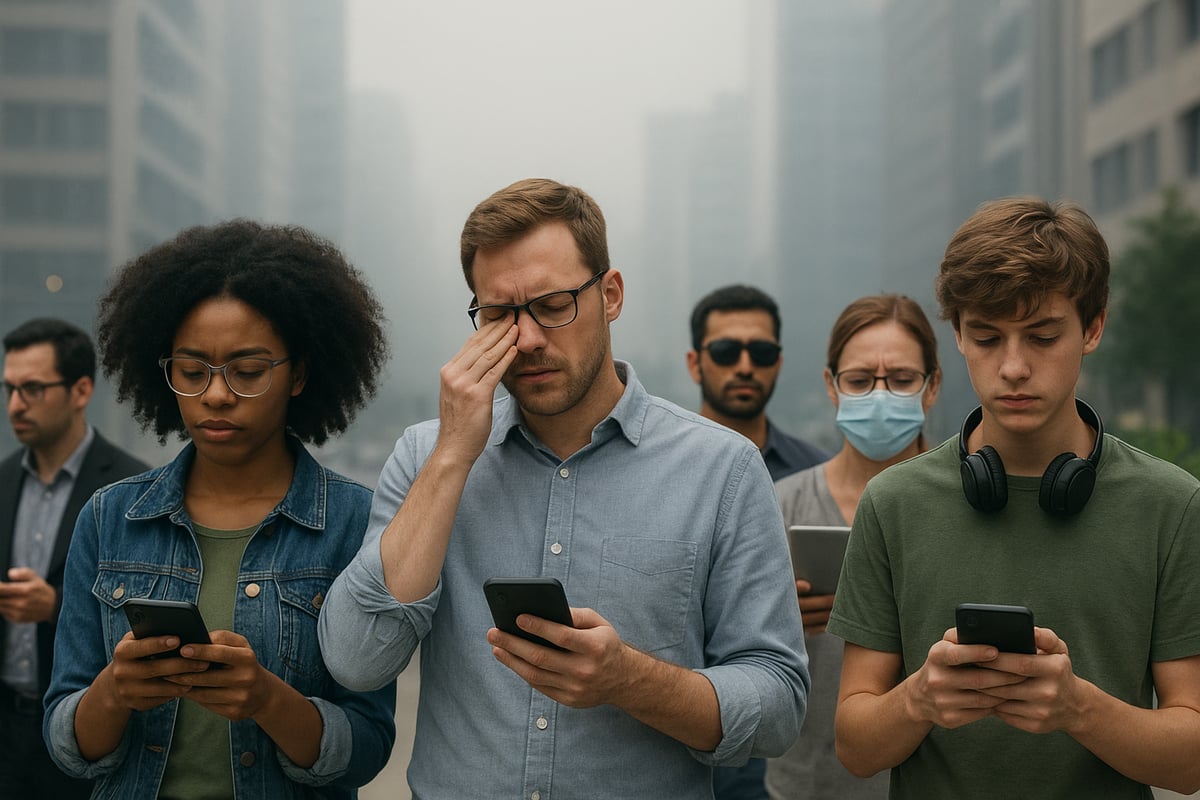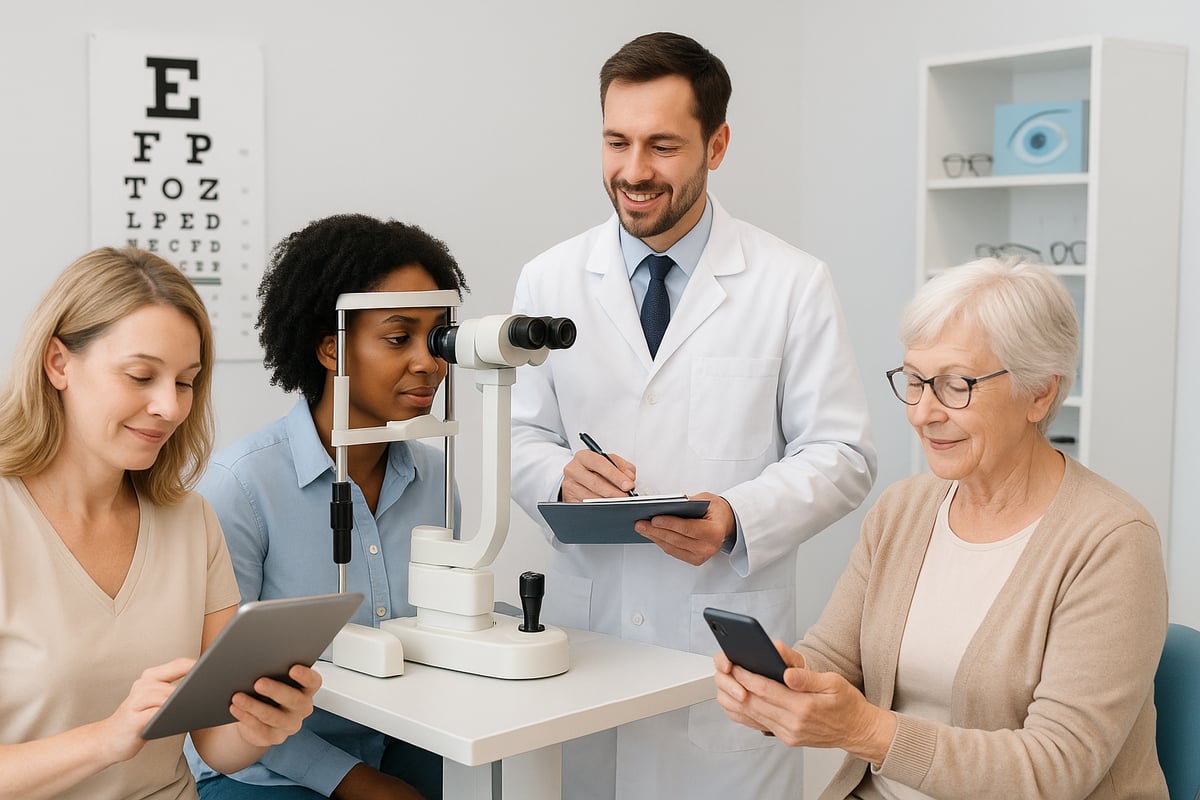Vision problems are on the rise in 2025, affecting people of all ages and backgrounds. Many overlook the hidden factors behind these changes, yet understanding the causes of vision deterioration is more important than ever.
This article uncovers nine unexpected reasons your eyesight may be at risk, from digital habits and environmental toxins to medical and lifestyle shifts. Knowing these causes can help you take action early, protect your vision, and avoid preventable loss.
Stay with us as we reveal these surprising threats and show you how to safeguard your eye health for the future.
Understanding Vision Deterioration: What’s Changing in 2025?
Vision deterioration is a gradual decline in the eyes’ ability to focus, perceive contrast, or adapt to changing light. Common symptoms include blurred vision, trouble seeing at night, frequent headaches, and increased eye fatigue. Many people do not notice these changes until daily tasks become difficult, which is why understanding the causes of vision deterioration is essential.
Recent years have seen a concerning rise in vision problems worldwide. According to the WHO report on global vision loss, millions of people are affected by declining eyesight, with a notable increase projected for 2025. These statistics highlight the urgency of addressing the causes of vision deterioration on both personal and public health levels.
Modern lifestyles are reshaping eye health in ways that previous generations never experienced. Extended screen time, remote work, and heavy reliance on digital devices expose eyes to artificial light and strain. Environmental changes, such as higher pollution levels and increased exposure to toxins, also contribute to the causes of vision deterioration.
Advances in medical research between 2023 and 2024 have uncovered new risk factors. Scientists now link certain environmental pollutants, chronic stress, and even common dietary deficiencies to vision decline. These findings suggest that the causes of vision deterioration are more varied and complex than previously thought.
Demographic shifts are also driving changes in eye health trends. The global population is aging rapidly, and age-related eye issues are becoming more prevalent. At the same time, children and young adults are spending more hours in front of screens, which may lead to earlier onset of vision complaints. Studies conducted in recent years predict that these patterns will continue, making prevention crucial.
Routine eye exams and early detection remain the cornerstone of protecting sight. Many subtle causes of vision deterioration can go unnoticed until significant loss occurs. For example, minor fluctuations in vision or occasional dryness may signal underlying problems that only a comprehensive eye exam can reveal.
Understanding the evolving landscape of eye health in 2025 empowers individuals to take proactive steps. By staying informed about the causes of vision deterioration, people can make informed choices, seek timely care, and reduce their risk of avoidable vision loss.

9 Surprising Causes of Vision Deterioration to Know in 2025
Vision health is increasingly under threat from factors that may surprise many people. While some causes of vision deterioration are well known, others are often overlooked. Exploring these unexpected contributors is vital for anyone aiming to protect their eyesight in 2025.

1. [Digital Eye Strain from Advanced Devices]
With the explosion of high-resolution screens, from smartphones and tablets to VR headsets, digital eye strain is fast becoming one of the leading causes of vision deterioration. The average person in 2025 spends over 7 hours a day on digital devices, often without adequate breaks.
Blue light emitted by these screens penetrates deep into the eye, potentially causing cumulative damage to the retina. Prolonged exposure is linked to digital eye strain, also known as Computer Vision Syndrome (CVS). Common symptoms include dry eyes, headaches, and blurred vision, all of which are early signs of deeper issues.
Remote work, online learning, and immersive gaming have all contributed to the surge in complaints. If you notice frequent discomfort after screen use, it could signal early causes of vision deterioration.
To combat this, experts recommend the 20-20-20 rule: every 20 minutes, look at something 20 feet away for 20 seconds. Blue light filters, regular screen breaks, and maintaining proper screen distance are also effective preventive strategies.
2. [Environmental Toxins and Air Pollution]
Environmental toxins and rising air pollution are silent but significant causes of vision deterioration in modern cities. Urban air is now filled with particulate matter (PM2.5, PM10) that can irritate and inflame the eyes.
Chemical exposures from household cleaners, pesticides, and industrial emissions further add to the risk. Recent case studies link pollution spikes to more frequent visits to eye clinics, especially during wildfire smoke and smog events.
These pollutants cause oxidative stress and chronic inflammation, damaging ocular tissues over time. In 2024, cities like Delhi and Los Angeles reported some of the highest pollution-related eye disease rates.
Protecting your eyes in such environments is crucial. Using air purifiers indoors, wearing protective eyewear outside, and minimizing exposure during high-pollution days can help reduce the causes of vision deterioration.
3. [Chronic Stress and Its Biological Impact]
Chronic stress is increasingly recognized as one of the hidden causes of vision deterioration. Stress alters blood flow and elevates cortisol, which can impact the delicate structures of the eye.
There is a strong link between chronic stress, hypertension, and retinal damage. Studies from 2023 and 2024 reveal that ongoing stress can trigger sudden vision changes, eye twitching, and visual disturbances.
High-pressure jobs and ongoing pandemic-related anxiety have made stress a daily reality for many. These factors contribute directly to the causes of vision deterioration by affecting vascular health and increasing inflammation.
Managing stress through mindfulness, therapy, and regular exercise is essential. Addressing mental health not only improves quality of life but also protects vision for the long haul.
4. [Undiagnosed Systemic Diseases]
Many systemic diseases lurk beneath the surface and are among the most overlooked causes of vision deterioration. Diabetes, hypertension, and autoimmune disorders can harm the retina and optic nerve through systemic inflammation and vascular changes.
Statistics show a significant percentage of vision loss cases are linked to undiagnosed diseases. Conditions such as diabetic retinopathy, hypertensive retinopathy, and lupus-related eye complications often go unnoticed until symptoms become severe.
Warning signs include fluctuating vision, floaters, and unexplained eye pain. Early detection through comprehensive health screenings and regular eye exams is vital.
For more information on how underlying health conditions can impact your eyesight, see Harvard Health on unexpected vision loss risks.
5. [Hormonal Fluctuations and Changes]
Hormonal shifts are frequently underestimated among the causes of vision deterioration. Changes related to menopause, thyroid disorders, and pregnancy can all affect eye health.
Hormonal imbalances may lead to dry eyes, blurred vision, or increased intraocular pressure. Research highlights notable gender differences, with women experiencing higher rates of vision changes during menopause and other hormonal transitions.
If you notice vision changes during periods of hormonal fluctuation, consult both your eye doctor and endocrinologist. Hormone testing, tailored eye drops, and nutritional support can be effective preventive measures.
6. [Sleep Disorders and Poor Sleep Quality]
Sleep disorders, including sleep apnea and chronic insomnia, are emerging as significant causes of vision deterioration. Poor sleep disrupts the body's ability to repair ocular tissues and increases the risk for conditions such as glaucoma.
In 2025, a growing segment of the population, especially shift workers and those with irregular schedules, report morning eye discomfort and fluctuating vision. Studies show that lack of REM sleep impairs optic nerve health, making regular sleep patterns essential.
Improving sleep hygiene—such as keeping a regular bedtime, limiting screen time before bed, and creating a restful environment—can help reduce these risks and protect against the causes of vision deterioration.
7. [Nutritional Deficiencies in Modern Diets]
Modern diets often lack essential nutrients critical for eye health, making nutritional deficiencies a leading cause of vision deterioration. Vitamins A, C, E, omega-3 fatty acids, lutein, and zeaxanthin are particularly important.
Trends in processed foods and restrictive diets have led to rising deficiency rates in 2024 and 2025. Symptoms such as night blindness, dry eyes, and slow adaptation to darkness can indicate nutritional problems.
For those on vegan or vegetarian diets, supplementation is key. A balanced diet rich in leafy greens, colorful vegetables, and healthy fats supports long-term vision and counters the causes of vision deterioration.
8. [Overuse of Eye Drops and Self-Medication]
Self-medicating with over-the-counter eye drops is a growing concern among the causes of vision deterioration. Long-term use of decongestant or steroid drops without medical supervision can lead to rebound redness, increased intraocular pressure, and even infection.
Sales of OTC eye drops have surged, particularly among allergy sufferers and frequent digital device users. Persistent symptoms should always be evaluated by a professional rather than masked with repeated self-medication.
Safer alternatives include preservative-free artificial tears and following strict guidelines for eye drop use. Always seek professional advice if symptoms persist or worsen.
9. [Genetic Predispositions Unmasked by Modern Lifestyles]
Genetics play a significant role among the causes of vision deterioration, especially as new risk genes for eye diseases are discovered. Modern lifestyles—characterized by poor diets, pollution, and excessive screen time—can amplify genetic risks.
Family history of macular degeneration or glaucoma increases the likelihood of developing these conditions in 2025. Advances in genetic testing have made early identification possible, allowing for personalized prevention strategies.
If you have a family history of vision problems, regular screenings and lifestyle modifications are essential. Genetic counseling can offer tailored advice to reduce the impact of inherited causes of vision deterioration.
Emerging Research & Future Risks for Vision Health
The landscape of vision science is changing rapidly as 2025 approaches. Researchers are uncovering new causes of vision deterioration, shifting the focus from traditional risk factors to a broader spectrum of influences. From genetics to global environmental shifts, these discoveries are expanding our understanding of what threatens eye health.

Technological and Environmental Shifts
Emerging technologies, such as nanotechnology and wearable devices, are both offering solutions and presenting new challenges. These innovations can improve monitoring and treatment, but they may also introduce unexpected causes of vision deterioration. For example, increased urbanization and pollution, combined with constant exposure to digital devices, are leading to complex interactions that affect ocular health.
A recent uptick in research highlights how environmental toxins, microplastics, and changes in climate patterns are influencing the prevalence and severity of vision problems. Scientists are closely tracking these factors to identify patterns and develop new preventive strategies.
Gene Therapies and Regenerative Medicine
Advances in genetics and regenerative medicine are reshaping the fight against degenerative eye conditions. New gene therapies aim to correct inherited disorders before they progress, while regenerative treatments seek to restore damaged retinal cells. This shift in focus is helping to address underlying causes of vision deterioration at their source.
For those interested in a deeper look at these conditions and treatments, the Degenerative Disease in Eyes Overview provides valuable insights into current research and future directions. These developments hold promise, but they also raise new questions about long-term outcomes and accessibility.
Artificial Intelligence and Early Detection
Artificial intelligence is transforming how experts detect and manage vision problems. AI-powered tools can now analyze retinal images and flag early signs of disease with remarkable accuracy. This technology is especially effective in screening for diabetic retinopathy, one of the leading causes of vision deterioration.
A recent study on AI in diabetic retinopathy detection showcases how machine learning algorithms can outperform traditional screening methods in identifying subtle changes. As these systems become more widespread, early intervention and personalized care are becoming more achievable for everyone.
Future Risks and Proactive Adaptation
While the future of eye health holds promise, it also presents new risks. Factors such as increased screen time, global migrations, and changing dietary habits are likely to introduce additional causes of vision deterioration. Experts predict that continuous adaptation, ongoing education, and regular screenings will be crucial for staying ahead of these trends.
To summarize, staying informed about research developments and embracing proactive health measures will be key to preserving vision in the years ahead. By understanding these emerging risks, individuals can make better decisions and reduce their personal risk of vision loss.
Proactive Steps to Protect Your Vision in 2025
Protecting your eyesight in 2025 requires a proactive approach, especially as the causes of vision deterioration become more complex and interconnected. With digital habits, environmental shifts, and medical factors all playing a role, taking action now is essential for preserving your vision.

Take Charge with Actionable Strategies
Early detection is key. Schedule comprehensive eye exams at least once a year, even if you have no symptoms. Many causes of vision deterioration, such as undiagnosed systemic diseases or environmental toxins, can progress silently until significant damage occurs.
Adopt healthy lifestyle habits to counteract the most common causes of vision deterioration:
- Balance your diet with nutrients like vitamin A, omega-3s, and lutein.
- Prioritize quality sleep and establish a regular sleep schedule.
- Manage stress with mindfulness, exercise, or therapy.
- Limit screen time and use the 20-20-20 rule to reduce digital eye strain.
- Protect your eyes from pollution and toxins with proper eyewear and air purifiers.
Use the table below as a quick reference for daily eye health habits:
| Habit | Benefit | Frequency |
|---|---|---|
| Eye exam | Early detection | Yearly |
| Nutrient-rich diet | Supports eye structure | Daily |
| Screen breaks | Reduces digital eye strain | Every 20 minutes |
| Stress management | Lowers risk of retinal damage | Ongoing |
| Sleep hygiene | Aids ocular repair | Nightly |
Leverage Technology and Trusted Resources
Modern technology offers new tools for monitoring vision, from smart apps that track screen time to wearable devices that detect changes in eye health. Collaborate with healthcare providers to ensure holistic care, especially if you have risk factors for any causes of vision deterioration.
Stay informed by seeking out reliable educational resources. For a deeper understanding of how different factors impact your eyes, visit Understanding Your Eye Health. Knowledge empowers you to recognize subtle warning signs and seek help promptly.
Remain vigilant against emerging threats. By integrating these proactive steps into your routine, you can significantly reduce your risk from the various causes of vision deterioration in 2025 and beyond.
After learning about the surprising factors that can affect your vision in 2025—from digital eye strain and environmental toxins to underlying health issues—it's clear how important it is to take proactive steps for your eye health. If you or someone you care about is concerned about degenerative eye conditions like macular degeneration, glaucoma, or other retinal issues, you don't have to navigate this journey alone. We're here to offer support and guidance tailored to your unique needs. If you're ready to explore how microacupuncture could help restore your vision, Schedule A Free Phone Call and let's talk about your options.
